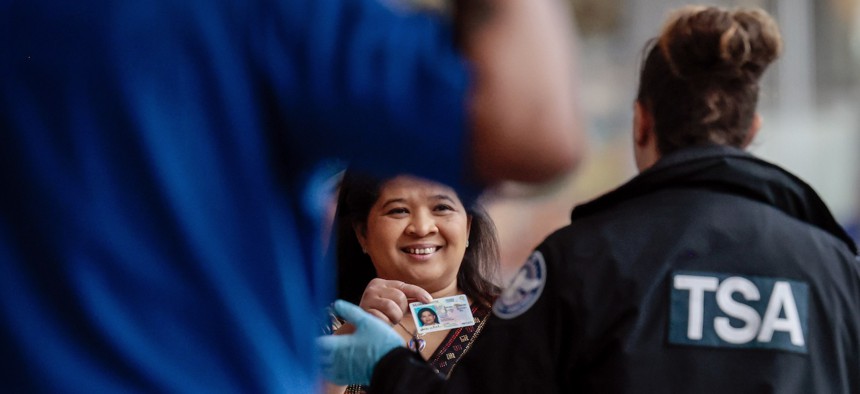
Monday’s decision follows last week’s oral arguments in the case, which challenges Homeland Security Secretary Kristi Noem’s March decision to outlaw unions at the airport security agency. Craig F. Walker/The Boston Globe via Getty Images
Federal judge blocks dissolution of union at TSA
Though the Transportation Security Administration has broad latitude to design and administer its own personnel system, U.S. District Judge Marsha Pechman found its contract with AFGE to be a “self-imposed restriction” on that power.
A federal judge on Monday issued a preliminary injunction blocking the Trump administration from stripping employees at the Transportation Security Administration of their collective bargaining rights.
U.S. District Judge Marsha Pechman, a Clinton appointee in the Western District of Washington, found that the initiative was aimed at “punishing” the American Federation of Government Employees for challenging the White House’s workforce policies in court. Monday’s decision follows last week’s oral arguments in the case, which challenges Homeland Security Secretary Kristi Noem’s March decision to outlaw unions at the airport security agency.
“The Noem determination appears to have been undertaken to punish AFGE and its members because AFGE has chosen to push back against the Trump administration’s attacks to federal employment in the courts,” Pechman wrote. “The First amendment protects against retaliation for engaging in litigation and public criticism of the government. And the Noem determination’s threadbare justification for termination of the [collective bargaining agreement] exposes the retaliatory nature of the decision.”
Since its inception following the Sept. 11, 2001, terror attacks, TSA has had broad discretion to administer its own personnel system. But after years of poor morale and low retention, the agency granted the workforce abridged collective bargaining rights in 2011 and expanded those rights in 2022, along with a new pay scale akin to the federal government’s General Schedule.
Pechman found that the decision to outlaw unions at TSA, coupled with the subsequent executive order barring collective bargaining for two-thirds of the federal workforce, amount to unlawful retaliation for AFGE and other unions’ First Amendment speech in opposition to the Trump administration’s policies.
“As to animus, there is strong evidence that the Noem determination comes from the Trump administration’s dislike for AFGE as a union pushing back against its federal employment policies,” she wrote. “The Noem determination attacks AFGE by name, stating the prior determinations and CBA ‘have solely benefited the . . . AFGE at TSOs’ expense.’ This statement mischaracterizes the CBA and further highlights a direct antipathy toward AFGE. It is simply not true that AFGE has solely benefited from the CBA or that the CBA has come at TSOs’ expense.”
And while TSA has broader discretion to manage its own workforce than other federal agencies, Pechman found that by signing its contract with AFGE last year, the agency forfeited some of that latitude. Between that fact and Noem’s cursory justification for reversing TSA’s treatment of unions, Pechman said the decision violates the Administrative Procedure Act.
“Noem has not explained why collective bargaining has threatened the safety of the transportation system or travelers in America,” Pechman wrote. “Such an explanation is particularly needed here, given the prior positions taken by TSA as to why collective bargaining benefits overall traveler safety and furthers TSA’s congressionally-mandated safety mission . . . The Noem determination fails to explain why the prior determinations’ conclusions about the merits of the CBA are no longer valid or that circumstances have changed.”
Pechman’s decision requires TSA to reinstate its contract with AFGE, particularly provisions allowing the union to represent workers in collective bargaining negotiations and personnel investigations, as well as requiring the agency to collect dues from employees’ paychecks on behalf of the union. TSA also must resume participation in grievance and arbitration proceedings.
AFGE National President Everett Kelley applauded Pechman’s ruling in a statement Monday.
“Today’s court decision is a crucial victory for federal workers and the rule of law,” he said. “The preliminary injunction underscores the unconstitutional nature of DHS' attack on TSA officers’ First Amendment rights. We remain committed to ensuring our members’ rights and dignity are protected, and we will not back down from defending our members’ rights against unlawful union busting.”
How are these changes affecting you? Share your experience with us:
Erich Wagner: ewagner@govexec.com; Signal: ewagner.47
NEXT STORY: Lynch: OPM’s hiring plan includes ‘blatant loyalty test’







